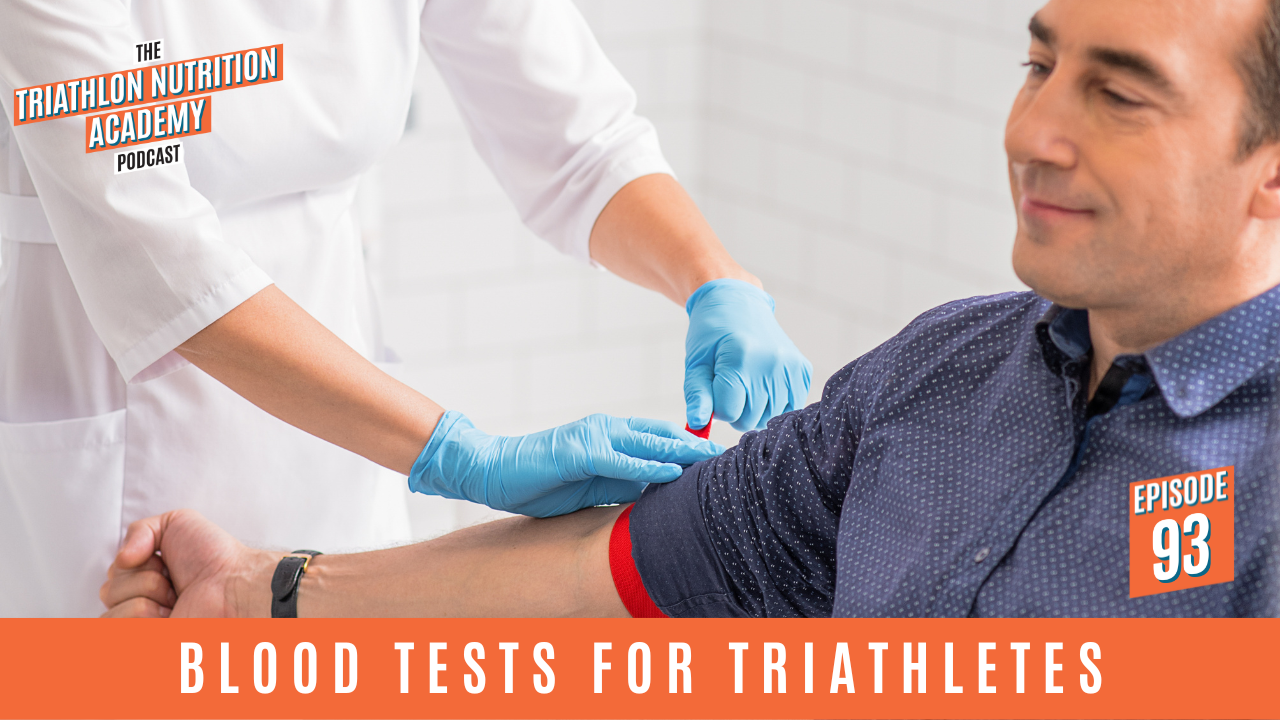Blood Tests for Triathletes - What, When & How Often Should You Get Checked for Optimal Performance?

As an endurance athlete, it's important to maintain optimal health and performance levels. One way to check that you’re doing that is to get regular blood tests.
I was asked recently by one of the triathletes in our Dietitian Approved Crew Facebook group my thoughts on the value of blood tests, as there are a lot of companies spruiking these across many platforms at the moment. While we go into this in depth in the Triathlon Nutrition Academy, I thought it was important enough to share with everyone.
Blood tests can help detect any potential problems early on and allow you to make necessary changes to your diet and training regimen. However, it's important to know which blood tests are necessary and why and, equally as important, how to interpret the results.
First and foremost, the purpose of getting blood tests is prevention. By catching any potential health issues early on, you can avoid serious illnesses or injuries. Additionally, regular blood tests can help you achieve optimal performance levels. For example, if your iron levels are low, you may experience fatigue and have trouble pushing yourself during training. By being proactive and identifying this issue through a blood test, you can take the necessary steps to correct it before it becomes a problem and so you can improve your performance.

However, if there is something that needs to be corrected, you need to have the knowledge and skills to be able to correct it (or engage the services of a professional who can advise you).
Be strategic in your approach – I have created a checklist and guide that you can download – it gives you a list of the tests I recommend, when and how often you should have them done and the ranges you should be looking at for each.
Download our FREE Blood Test Guide for Triathletes
Disclaimer – The contents below are not personal medical advice. So please see your Sports Physician, if you're not sure about anything.
HOW OFTEN SHOULD I GET BLOOD TESTS DONE?
Generally speaking, it's recommended that you get a blood test once or twice a year. Look to do a test in your off season as a baseline measure, so you can compare it to what happens when you’re in peak training load and peak season. Then if you want to do it again, do it leading into one of your key events, when your training volume is heavy.
WHICH BLOOD TESTS SHOULD YOU GET AS A TRIATHLETE?
Some of the key blood tests include a complete blood count (CBC). A CBC will give you an overview of your overall health, including:
- your red and white blood cell count and platelet count
- LFTs (liver function tests / hepatic panel)
- U & Es (urea and electrolytes) to check your kidney function
- Cholesterol and your triglyceride levels
- Iron and ferritin levels,
- Vitamin D levels
- Testosterone levels
- B12
As an endurance athlete, it is essential to ensure that you are getting the right nutrients to fuel your body and optimise your performance. Two key nutrients to check are iron and vitamin D.
IRON
Low iron and ferritin levels can lead to anaemia, which can cause fatigue and decreased endurance. Iron is vital for many key functions in the body, including:
- oxygen transport
- energy metabolism
- brain function, and
- the immune system.
As an active person, low levels of iron can impact your:
- endurance or aerobic capacity
- mood
- perceived fatigue levels
- training adaptations, and
- your overall health status.
Female athletes with regular monthly menstrual losses, endurance athletes, vegetarian and vegan athletes, and those with lower energy intake are at high risk of having low iron levels.
You should prioritise iron in your diet and monitor your levels once a year. If you are a female endurance athlete or have a history of iron depletion, then you should keep an eye on it twice a year. If you have had a recent history of iron depletion within the last two years, then you should monitor your levels quarterly.
Different stages of iron deficiency exist, so it is essential to understand the different components of iron studies and the reference ranges for athletes.
VITAMIN D
Vitamin D is essential for maintaining strong bones and muscles, and low levels can lead to increased risk of stress fractures.
Vitamin D plays an important role in the homeostasis of calcium and phosphorus, which are critical for building bones. It is also important for:
- the reduction of inflammation
- cell growth
- neuromuscular and immune function
- glucose metabolism, and
- optimal muscle function.
As an endurance athlete, you need to ensure that you are getting enough vitamin D to prevent hypocalcemic tetany, which is an involuntary contraction of muscles that leads to cramps and spasms. While you can get vitamin D from food, sun exposure is essential for converting vitamin D to its active form. Depending on where you live, there might be times of the year when you do not have enough sun exposure to do that conversion. Therefore, you should check your vitamin D levels in the winter and summer. Deficiency in vitamin D increases your risk of:
- bone injuries
- chronic musculoskeletal pain, and
- viral respiratory tract infections.
It is vital to have your iron and vitamin D levels checked regularly to prevent depletion and deficiency. If you fit into any of the high-risk groups mentioned earlier, then you should prioritise these nutrients even more. It is also essential to work with a sports physician who understands athlete ranges and can help you optimise your nutrient intake for better performance.
MALE AND FEMALE SEX HORMONES and THYROID HORMONES
Your sex hormones are a good indicator or a red flag that you need to fuel better. We don't want to go too far in the red, where we are putting ourselves in low energy availability, our sex hormones go awry, and we are down in the RED-S category.
B12
Important for the production of red blood cells. red blood cell contains haemoglobin, which is a protein that carries oxygen. So we want to make sure that that is in a good range. Because if that's low, we're anaemic. And that's not going to feel very good when you're trying to exercise. So abnormalities in your full blood count could indicate something like anaemia, or it might also indicate that you've got some physiological changes with altitude exposure. It could also indicate dehydration, that you have a viral infection or some sort of inflammatory condition.
BONE DENSITY (although not a blood test)
Test this to make sure that the impact of your fuelling and training isn't having a negative effect on your bone mineral density. Helps to avoid stress fractures and, later in life, osteoporosis. It will indicate whether you need to do a better job of periodisation – eating for the training work required for three sports. If you aren’t fuelling sufficiently then your body can’t provide everything your organs and bones need to keep you functioning.

WHAT TIME IS BEST TO TEST?
Generally in the morning but NOT after a really heavy training session or race (that will give you inflated results).
Same time of day for consistency.
WHAT ELSE SHOULD YOU CONSIDER BEFORE INVESTING IN BLOOD TESTS?
Use my Blood Tests for Triathletes Guide for some reference ranges and a bit of a cheat sheet to guide you.
Download: https://www.dietitianapproved.com/blood-tests-for-triathletes
It's important to note that blood test results should always be interpreted by a medical professional or sports physician. It's not recommended to try to interpret the results yourself or make changes to your diet or training regimen without consulting a professional.
CONCLUSION
In conclusion, regular blood tests can be incredibly beneficial for endurance athletes, as they can help identify potential health issues early on and improve overall performance levels. However, it's important to know which blood tests are necessary and how to interpret the results. By working with a medical professional or sports physician, you can ensure that you're getting the most out of your blood tests and achieving your best possible performance.





